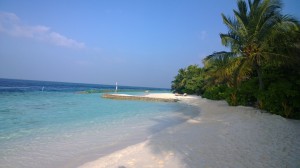The Future of Earth
I visited early this year Maldives, paradise islands in the middle of vast Indian Ocean. Blessed with eternal sun and nice warm temperature, thrilling corals reefs and unbelievable stock of exotic fish, the accidental visitor is overwhelmed. People are very friendly and they are relatively speaking well-off: per capita income is the highest of the region.
Simultaneously, we know that these islands are under threat of climate change: the highest point in all Maldives is only 2,8 meter above sea level. That is not very much. The current state-of-art scenarios forecast at least one meter sea level rise, which would already be close to disastrous to may of the Islands and atolls.
Many locals whom I talked to told me the weather patterns changed after Tsunami in 2004. Monsoons, that used have very regular pattern, do not have that predictability anymore. This is detrimental particularly to nearby countries like Sri Lanka, that is very dependent on agriculture. Leave alone India. Was the Tsunami some kind of trigger point, I don’t know. However, this is what those people, who actually live there, testify.
Yesterday I was very impressed when a former top officer of our Ministry of Finance warned about the calamity of climate change. This man, mr. Raimo Sailas, that has been known for his warnings about Finland’s rising financial debt, was suddenly painting a much larger picture. This gave me hope that after all, the consciousness is perhaps rising among those who have not earlier considered the topic-
Australian paleontologist and environmental activist Tim Flannery has pointed out that Earth’s history is all about co-evolution, punctuated by sudden asteroids, climate shifts and invasive species that have caused upheavals in our ecosystems. Now human being is playing the intruder and changing the scene, which now as before means impoverishing the planet.
The Earth will recover from this as it has always done. What happens to human species is another question. Looking back and learning from the vast history of Earth, suggest a grim future for human being.
Unless we change the course which we still can do.

There is 1 comment. Add Yours.